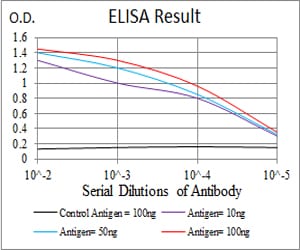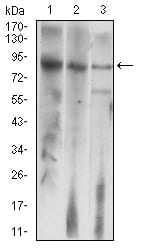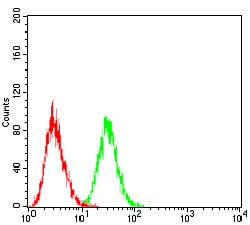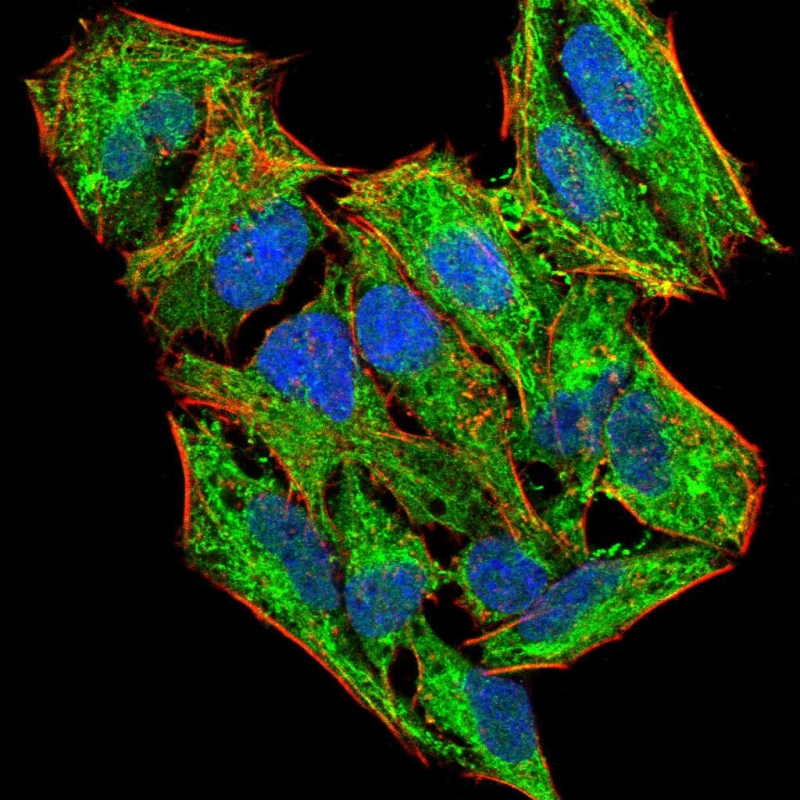



| WB | 1/500-1/1000 | Human,Mouse,Rat |
| IF | 咨询技术 | Human,Mouse,Rat |
| IHC | 1/50-1/100 | Human,Mouse,Rat |
| ICC | 1/50-1/200 | Human,Mouse,Rat |
| FCM | 1/50-1/100 | Human,Mouse,Rat |
| Elisa | 咨询技术 | Human,Mouse,Rat |
| Aliases | HHG; LHR; LCGR; LGR2; ULG5; LHRHR; LSH-R; LH/CGR; LH/CG-R |
| Entrez GeneID | 3973 |
| clone | 8G9A2 |
| WB Predicted band size | 78.6kDa |
| Host/Isotype | Mouse IgG1 |
| Antibody Type | Primary antibody |
| Storage | Store at 4°C short term. Aliquot and store at -20°C long term. Avoid freeze/thaw cycles. |
| Species Reactivity | Human |
| Immunogen | LHR-29 from ATCC |
| Formulation | Purified antibody in PBS with 0.05% sodium azide |
+ +
以下是关于Fas抗体的3篇经典文献及其摘要概括:
1. **《Antibodies to CD3/T-cell receptor complex induce death by apoptosis in immature T cells in thymic cultures》**
- 作者:Smith, C. A., Williams, G. T., et al.
- 摘要:研究发现针对T细胞受体的抗体可诱导胸腺中未成熟T细胞凋亡,揭示了Fas/FasL系统在胸腺选择中的潜在作用,为免疫耐受机制提供了新视角。
2. **《Monoclonal antibody-mediated tumor regression by activation of apoptosis through Fas/APO-1 antigen》**
- 作者:Trauth, B. C., Klas, C., et al.
- 摘要:首次报道了激活Fas(APO-1)的单克隆抗体可直接诱导肿瘤细胞凋亡,证实Fas信号通路在癌症治疗中的潜在应用价值。
3. **《The Fas death factor》**
- 作者:Nagata, S., Golstein, P.
- 摘要:综述性文章,系统总结了Fas及其配体(FasL)的分子结构、信号传导机制及其在免疫系统调控、自身免疫疾病和癌症中的关键作用。
(注:以上文献信息为示例,实际引用时建议通过学术数据库核对具体细节。)
Fas antibodies are immunological tools targeting the Fas receptor (CD95/APO-1), a cell surface protein belonging to the tumor necrosis factor receptor (TNFR) family. The Fas/Fas ligand (FasL) system is a critical pathway regulating programmed cell death (apoptosis), essential for maintaining tissue homeostasis, immune response modulation, and eliminating damaged or malignant cells. Upon FasL binding, Fas receptors cluster and form the death-inducing signaling complex (DISC), triggering caspase activation and apoptosis.
Researchers developed Fas antibodies to study this pathway's biological roles and therapeutic potential. Agonistic Fas antibodies (e.g., clone CH11) mimic FasL by cross-linking Fas receptors, inducing apoptosis in vitro and in vivo. These are used to explore apoptosis mechanisms, cancer cell sensitivity, and immune cell regulation. Conversely, antagonistic antibodies (e.g., clone ZB4) block Fas-FasL interactions, inhibiting apoptosis—useful in studying autoimmune diseases or ischemic injuries where excessive apoptosis occurs.
Clinically, Fas antibodies have dual implications. Overactive Fas signaling is linked to tissue damage in hepatitis and sepsis, while defective signaling contributes to autoimmune disorders (e.g., systemic lupus erythematosus) and cancer immune evasion. Therapeutic strategies include using agonistic antibodies to kill cancer cells or antagonistic antibodies to protect tissues from apoptosis. However, challenges like hepatotoxicity and variable tumor responses limit clinical translation. Ongoing research focuses on antibody engineering (e.g., bispecific antibodies) to enhance specificity and reduce off-target effects, aiming to harness Fas pathway modulation for diseases like cancer, autoimmunity, and neurodegeneration.
×